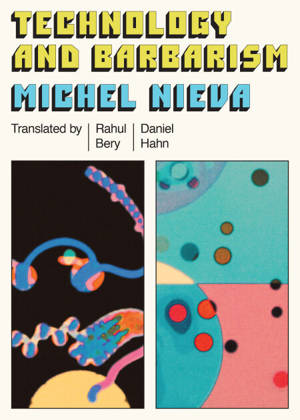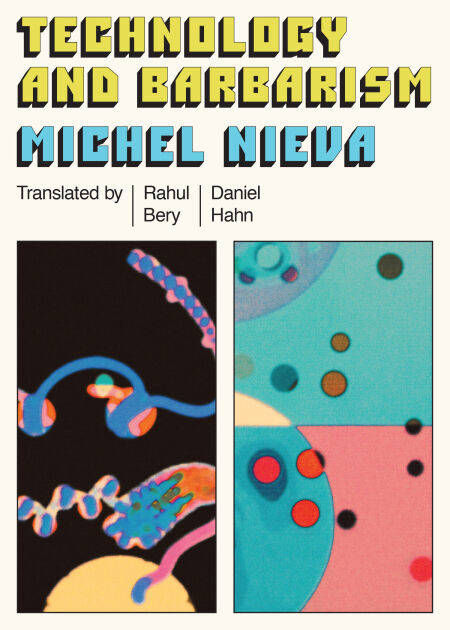
- Retrait gratuit dans votre magasin Club
- 7.000.000 titres dans notre catalogue
- Payer en toute sécurité
- Toujours un magasin près de chez vous
- Retrait gratuit dans votre magasin Club
- 7.000.0000 titres dans notre catalogue
- Payer en toute sécurité
- Toujours un magasin près de chez vous
Technology and Barbarism EBOOK
or: how billionaires will save us from the end of the world
Michel Nieva
Ebook | Anglais
15,76 €
+ 15 points
Description
Thought-provoking pieces of nonfiction exploring the crossroads of technology with art and science, as well as how hard science fiction has inspired the craziest ideas of our times, for the good and the bad.
The nonfiction pieces included in Technology and Barbarism, as well as the long essay "Capitalist Science Fiction," constitute the nonfiction alternative to Nieva’s Dengue Boy and has similar potential to achieve cult-status. Equally fast and furious, grounded in deep research as well as far-reaching literary traditions, Nieva writes about the crossroads between civilization and barbarism through history, literature, and the incidence of genetics in the arts and humanities.
Could the inspiration for Kafka's stories have come from his visits to human zoos where he saw indigenous people kidnapped from Tierra del Fuego? Can an algorithm understand the verses of Rubén Darío? Can bacteria write literature? And can a monkey reproduce the complete works of Shakespeare? These are some of the questions that run through this collection of essays, which explores the almost always ambiguous threshold that technology and culture have drawn between what is understood as human and what is not, living and nonliving, and which is the seed of the biggest questions of this century.
From nineteenth century science fiction to contemporary art exhibitions, via a philosophical take on COVID, this book examines the impact of capitalism, indigenous extermination, medical policies in Latin America and elsewhere, in order to interrogate our very identity.
In "Capitalist Science Fiction," Nieva studies the influence of historical "hard" science fiction on technology and capitalism today, with a special focus on Silicon Valley, and a particular spin at the end on, of course, Elon Musk. The essay is totally timely and super smart.
The nonfiction pieces included in Technology and Barbarism, as well as the long essay "Capitalist Science Fiction," constitute the nonfiction alternative to Nieva’s Dengue Boy and has similar potential to achieve cult-status. Equally fast and furious, grounded in deep research as well as far-reaching literary traditions, Nieva writes about the crossroads between civilization and barbarism through history, literature, and the incidence of genetics in the arts and humanities.
Could the inspiration for Kafka's stories have come from his visits to human zoos where he saw indigenous people kidnapped from Tierra del Fuego? Can an algorithm understand the verses of Rubén Darío? Can bacteria write literature? And can a monkey reproduce the complete works of Shakespeare? These are some of the questions that run through this collection of essays, which explores the almost always ambiguous threshold that technology and culture have drawn between what is understood as human and what is not, living and nonliving, and which is the seed of the biggest questions of this century.
From nineteenth century science fiction to contemporary art exhibitions, via a philosophical take on COVID, this book examines the impact of capitalism, indigenous extermination, medical policies in Latin America and elsewhere, in order to interrogate our very identity.
In "Capitalist Science Fiction," Nieva studies the influence of historical "hard" science fiction on technology and capitalism today, with a special focus on Silicon Valley, and a particular spin at the end on, of course, Elon Musk. The essay is totally timely and super smart.
Spécifications
Parties prenantes
- Auteur(s) :
- Traducteur(s):
- Editeur:
Contenu
- Nombre de pages :
- 240
- Langue:
- Anglais
Caractéristiques
- EAN:
- 9781662603198
- Date de parution :
- 23-02-26
- Format:
- Ebook
- Protection digitale:
- Adobe DRM
- Format numérique:
- ePub

Les avis
Nous publions uniquement les avis qui respectent les conditions requises. Consultez nos conditions pour les avis.






